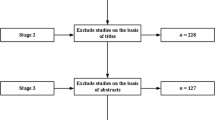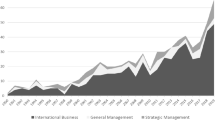Abstract
Knowledge is one of the most strategically important resources to sustain competitive advantage in an organization. So its creation and management has attracted the attention of managers and researchers alike. Organizational learning has been positively associated with innovation and performance and knowledge sharing has been associated with innovation performance. Although, some authors argued that organizational learning and knowledge sharing are complementary, there are few studies that have empirically tested the relationship between them. The purpose of this study was to analyze its relation and to empirically test it in the hospitality industry. Based on the results of the structural equation modeling approach on 244 Spanish hotels we confirmed a positive relationship between the variables. The findings are discussed; implications and future lines of research are presented.


Similar content being viewed by others
References
Al-Eisa, A. S., Furayyan, M. A., & Alhemoud, A. M. (2009). An empirical examination of the effects of self-efficacy, supervisor support and motivation to learn on transfer intention. Management Decision, 47(8), 1221–1244.
Baggio, R., & Cooper, C. (2010). Knowledge transfer in a tourism destination: The effects of a network structure. Service Industries Journal, 30(10), 1757–1771.
Cegarra-Navarro, J. G., & Rodrigo-Moya, B. (2007). Learning culture as a mediator of the influence of an individual’s knowledge on market orientation. Service Industries Journal, 27(5), 653–669.
Cegarra-Navarro, J. G., Cordoba-Pachon, J.-R., & Fernandez de Bobadilla, G. W. (2009). Creating environmental knowledge through ‘green communities’ in the Spanish pharmaceutical industry. Service Industries Journal, 29(12), 1745–1761.
Cegarra-Navarro, J.-G., Wensley, A. K. P., & Martínez-Conesa, E.-Á. (2010). A multi-sector comparison of relational learning and information and communication technologies adoption. Service Industries Journal, 30(6), 991–1005.
Chamberlin, T., Doutriaux, J., & Hector, J. (2010). Business success factors and innovation in Canadian service sectors: An initial investigation of inter-sectoral differences. Service Industries Journal, 30(2), 225–246.
Fan, Y.-W., & Ku, E. (2010). Customer focus, service process fit and customer relationship management profitability: The effect of knowledge sharing. Service Industries Journal, 30(2), 203–223.
Fiol, C. M., & Lyles, M. A. (1985). Organizational learning. The Academy of Management Review, 10(4), 803–813.
Firestone, J. M., & McElroy, M. W. (2004). Organizational learning and knowledge management: The relationship. The Learning Organization, 11(2), 177–184.
Garvin, D. A. (1993). Building a learning organization. Harvard Business Review, 71(4), 78–91.
Gold, A. H., Malhotra, A., & Segars, A. H. (2001). Knowledge management: An organizational capabilities perspective. Journal of Management Information Systems, 18(1), 185–214.
Hendriks, P. (1999). Why share knowledge? The influence of ICT on the motivation for knowledge sharing. Knowledge and Process Management, 6(2), 91–100.
Hult, G. T. M., & Ferrell, O. C. (1997). Global organizational learning capacity in purchasing: Construct and measurement. Journal of Business Research, 40(2), 97–111.
Ipe, M. (2003). Knowledge sharing in organizations: A conceptual framework. Human Resource Development Review, 2(4), 337–359.
Kamasak, R., & Bulutlar, F. (2010). The influence of knowledge sharing on innovation. European Business Review, 22(3), 306–317.
Kim, T., & Lee, G. (2011). A modified and extended Triandis model for the enablers-process-outcomes relationship in hotel employees’ knowledge sharing. The Service Industries Journal, 1–32.
Kuo, R. Z., & Lee, G. G. (2009). KMS adoption: The effects of information quality. Management Decision, 47(10), 1633–1651.
Lee, S.-C., Liang, H., & Liu, C.-Y. (2010). The effects of absorptive capacity, knowledge sourcing strategy, and alliance forms on firm performance. Service Industries Journal, 30(14), 2421–2440.
Lin, H. F. (2007). Knowledge sharing and firm innovation capability: An empirical study. International Journal of Manpower, 28(3/4), 315–332.
Lindblom, A., & Tikkanen, H. (2010). Knowledge creation and business format franchising. Management Decision, 48(2), 179–188.
Lu, I.-Y., Su, T.-H., & Huang, I.-C. (2010). Consulting knowledge and organisation’s absorptive capacity: A communication chain perspective. Service Industries Journal, 30(12), 2007–2022.
McLeod, M. T., Vaughan, D. R., & Edwards, J. (2010). Knowledge networks in the tourism sector of the Bournemouth, Poole, and Christchurch conurbation: Preliminary analysis. Service Industries Journal, 30(10), 1651–1667.
Mehrizi, M. H. R., & Bontis, N. (2009). A cluster analysis of the KM field. Management Decision, 47(5), 792–805.
Palacios-Marques, D., & Garrigos-Simon, F. J. (2005). A measurement scale for knowledge management in the biotechnology and telecommunications industries. International Journal of Technology Management, 31(3/4), 358–374.
Senge, P. (1990). The fifth discipline: The art and practice of the learning organization. New York: Random House.
Shang, K.-C. (2009). Integration and organisational learning capabilities in third-party logistics providers. Service Industries Journal, 29(3), 331–343.
Shieh, C.-J. (2011). Study on the relations among the customer knowledge management, learning organization, and organizational performance. Service Industries Journal, 31(5), 791–807.
Spender, J.-C. (2008). Organizational learning and knowledge management: Whence and whither? Management Learning, 39(2), 159–176.
Van den Hooff, B., & Van Weenen, F. (2004). Committed to share: Commitment and CMC use as antecedents of knowledge sharing. Knowledge and Process Management, 11(1), 13–24. doi:10.1002/kpm.187.
Yang, J.-T. (2007). The impact of knowledge sharing on organizational learning and effectiveness. Journal of Knowledge Management, 11(2), 83–90.
Yang, J.-T. (2009). Individual attitudes to learning and sharing individual and organisational knowledge in the hospitality industry. Service Industries Journal, 29(12), 1723–1743.
Yang, B., Watkins, K. E., & Marsick, V. J. (2004). The construct of the learning organization: Dimensions, measurement, and validation. Human Resource Development Quarterly, 15(1), 31–55.
Yeung, A. C. L., Lai, K.-H., & Yee, R. W. Y. (2007). Organizational learning, innovativeness, and organizational performance: A qualitative investigation. International Journal of Production Research, 45(11), 2459–2477.
Yi, J. (2009). A measure of knowledge sharing behavior: Scale development and validation. Knowledge Management Research and Practice, 7(1), 65–81.
Author information
Authors and Affiliations
Corresponding author
Rights and permissions
About this article
Cite this article
Iebra Aizpurúa, L., Zegarra Saldaña, P.E. & Zegarra Saldaña, A. Learning for sharing: an empirical analysis of organizational learning and knowledge sharing. Int Entrep Manag J 7, 509–518 (2011). https://doi.org/10.1007/s11365-011-0206-z
Published:
Issue Date:
DOI: https://doi.org/10.1007/s11365-011-0206-z




